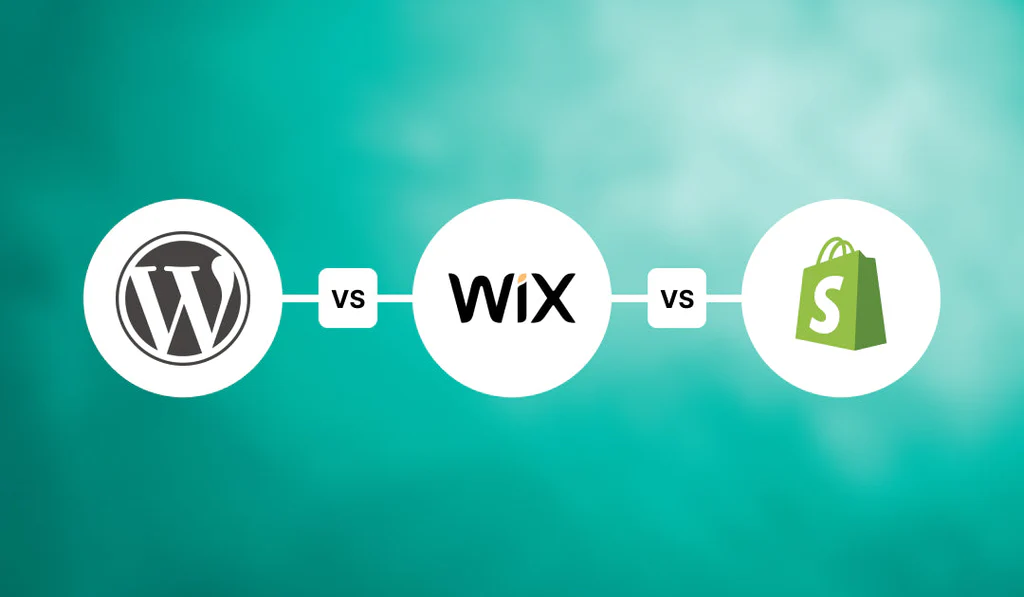Three giants that rule the website development world are WordPress, Wix, and Shopify. Each platform has its own set of target users and strengths. Whether you’re launching a blog, building a business site, or setting up an online store, choosing the right platform can save you time, money, and tech headaches down the road.
Let’s break down the differences to help you make a smart, informed decision.
1. Overview of Each Platform
WordPress.org
- Type: Open-source CMS (Content Management System)
- Best For: Blogs, business websites, eCommerce, portfolios, forums, and more
- Flexibility: Maximum – fully customizable
- Cost: Free to use, but requires separate hosting, domain, and plugins
Wix
- Type: All-in-one website builder
- Best For: Beginners and small businesses looking for ease of use
- Flexibility: Moderate – drag-and-drop with limited code-level access
- Cost: Monthly subscriptions (free plan available with ads)
Shopify
- Type: Hosted eCommerce platform
- Best For: Online stores and product-based businesses
- Flexibility: Focused – built for eCommerce, less flexibility for blogs or other content
- Cost: Monthly subscriptions, plus transaction fees
2. Ease of Use
Wix: Winner for Simplicity
Wix offers an intuitive drag-and-drop interface with pre-built templates. It’s ideal for non-techies who want a beautiful website up and running quickly. No coding skills needed.
Shopify: eCommerce Simplicity
Shopify simplifies the online store setup process. You can manage inventory, accept payments, and fulfill orders with ease—even if you’ve never run a store before.
WordPress: Steeper Learning Curve
WordPress is a bit more technical to set up but offers unmatched control. With themes and page builders like Elementor, it’s become more user-friendly, but there’s still a learning curve compared to Wix.
3. Design & Customization
WordPress: Ultimate Customization
With thousands of themes and plugins—and full access to code—WordPress is incredibly flexible. You can build virtually anything with the right know-how or developer help.
Wix: Stylish Templates with Limits
Wix has gorgeous templates and lots of built-in design options, but customization is limited compared to WordPress. You also can’t switch templates once your site is live.
Shopify: Clean Design for Stores
Shopify offers sleek, mobile-friendly store themes optimized for conversion, but design customization beyond what’s offered often requires some coding.
4. eCommerce Capabilities
Shopify: The King of eCommerce
Shopify is purpose-built for online stores. Features like product management, inventory tracking, multiple payment gateways, and shipping integrations come standard.
WordPress: Powerful with WooCommerce
With the WooCommerce plugin, WordPress can become a full-fledged online store. It offers great flexibility but requires more manual setup.
Wix: Basic Store Features
Wix does offer eCommerce features, but it’s best for smaller stores. Inventory and product options are limited compared to Shopify or WooCommerce.
5. SEO and Blogging
WordPress: SEO Powerhouse
WordPress gives you full control over URLs, meta tags, and sitemaps. Plugins like Yoast SEO or Rank Math make it easy to optimize your content.
Wix: Improved But Still Behind
Wix has improved its SEO features over the years, but it still lacks the depth and control that WordPress offers.
Shopify: Decent for Product SEO
Shopify handles basic SEO well (title tags, meta descriptions), but it’s more eCommerce-focused and not ideal for content-heavy SEO strategies.
6. Cost Breakdown
| Platform | Starting Cost | Hosting Included? | Additional Costs |
| WordPress | Free (plus hosting ~$3–$10/mo) | No | Themes, plugins, developer fees |
| Wix | Free (with ads), Premium ~$16–$39/mo | Yes | Add-ons, app market tools |
| Shopify | $29–$299/mo | Yes | Transaction fees, apps, themes |
7. Scalability and Control
- WordPress is ideal if you want full control and scalability over time. It’s great for growing businesses, blogs, and custom web projects.
- Wix is better suited for simpler websites that won’t require much technical expansion.
- Shopify can scale with your store, especially with Shopify Plus for high-volume businesses.
Final Verdict: Which One is Right for You?
| Use Case | Recommended Platform |
| Blog or Content-Focused Website | WordPress |
| Small Business or Portfolio Site | Wix |
| Large or Growing Online Store | Shopify |
| Custom Project with Flexibility | WordPress |
| Quick Setup with Minimal Tech Skills | Wix |
Conclusion
Your perfect platform depends on your goals, budget, and comfort with tech. If you want long-term flexibility and power, WordPress is the way to go. If you want a beautiful site without touching code, Wix makes it easy. And if selling products is your priority, Shopify has everything you need to run a professional online store.
Still unsure? Try starting with a free trial or basic plan on each to test the waters—your ideal website is just a few clicks away.

